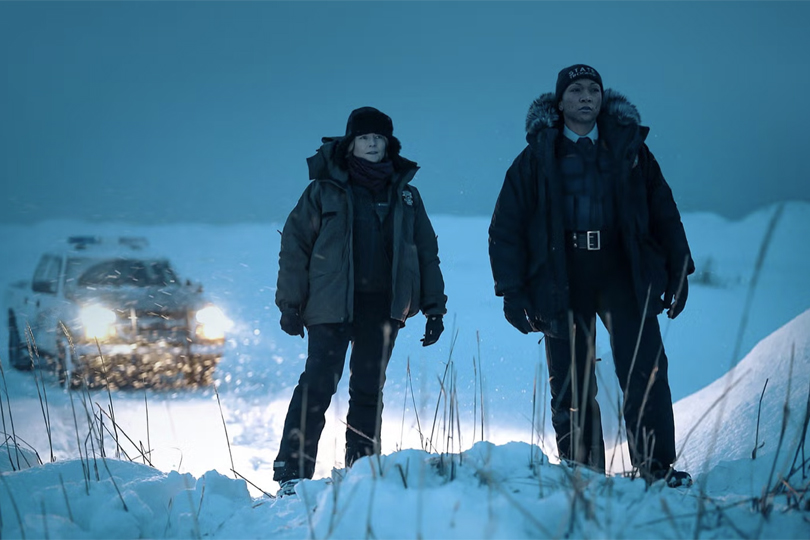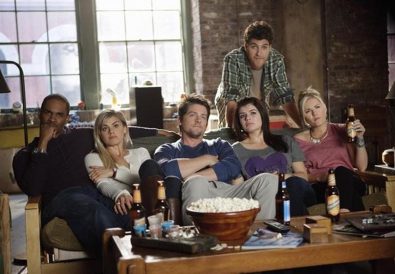By Anne T. Donahue
This week, True Detective: Night Country wrapped up its six-episode season, and reactions were mixed. On the one hand, I loved the show, the performances, the subject matter, the way I didn’t know if Rose (Fiona Shaw) was a ghost or just some lady who chose to live in Ennis without much explanation. And on the other hand, series creator Nick Pizzolatto stoked the TD fanboy flames by taking to Instagram to create a space in which everybody mad at Night Country could safely sound off.
Frankly, I cannot. Not with Pizzolatto, not with people angry that Night Country wasn’t like the series’ first season (like, nothing can be – relax), not with the fact that season two existed at all. In my humble (and correct) opinion, Night Country took many big swings, hit the majority of its narrative out of the park, and gave us performances that were compelling and interesting and made me read theories on the internet like it was Mad Men circa 2014. It did exactly what terrific TV should do: entertained us, confused us, delivered a one-eyed polar bear, and made us think. And then it ended too soon for my liking.
Which I mean in a good way. Nothing weakens a story like the feeling that you’re stuck in a creative elevator somewhere between floors. I like missing a TV show. I like wishing I could have hours more of it because I’ve chosen to be lost in that world. I like being angry to hear that a series creator has opted to wrap everything up despite largescale cultural interest and a conveyer belt of awards. Quitting while you’re ahead is a power move; it’s leaving a party when you’re still having fun and the shrimp ring isn’t room temperature yet. It is absolutely never, ever a bad idea. I’m willing to bet that anybody reading this has ever looked back and wished they’d stayed someplace longer.
Enter: Vanderpump Rules and its Bravo contemporaries. Last year at this time, we were dissecting the logistics of Tom Sandoval’s affair with castmate and friend Rachel Leviss, and nothing in the cultural world mattered more. It was egregious! It was scandalous! It was infuriating! And the lead-up to the season finale – the largely impromptu episode recorded last-minute – was like counting down to the rain scene in The Notebook. In real time, we got to witness the implosion of several relationships, psyches, and the way reality television was approached and consumed. Vanderpump was also gloriously revived; the series had been a snore in the lead-up to season 10, and Scandoval (as it became known) was a jolt to the system, delivering on the promise that reality TV can and will always, well, deliver.
And that’s where it should have ended. This season, I could not possibly care about these people less, and the feeling’s followed me into Real Housewives of Beverly Hills, Potomac, and even Orange County. I love a long-running franchise (sometimes), but it’s got to follow the blueprint of Law and Order SVU: characters need to grow, plots need a dose of madness, and the formula needs to be reimagined to reflect the changing times. Salt Lake City figured it out (although I am terrified for how it can possibly continue to be great after this season’s finale), New York did it well, and Miami has been a gift. But the longer a show defined by its dramatic turns go on, the less impactful those moments become when they’re placed between monotony. This week, Tom Sandoval was featured in The New York Times and the profile only mattered because it was written brilliantly, and he said some of the stupidest shit I have ever read in my life. Is this man a compelling person? Not really! Would I likely have cared more if after last season, Tom and pals bowed out of Bravo and left us to form our own conclusions based solely on their social media? Yes. The greatest shows of all time know when to end.
And this includes reality television, especially if the cast is static. Competition-based series can give and take plot twists, games, eliminations, and rose ceremonies, but lifestyle shows rely on narrative. This is why Salt Lake City broke our brains. This is why we adore Aesha and Captain Chambers from Below Deck: Australia (and why Luke should go to hell). This is why it’s frustrating to watch Kyle Richards dance around her split with husband Mauricio and remain coy around her personal life: your personal life is the story. The way you approach it reflects your arc. This is a TV show centered around your life. If you opt out of participating, that’s totally fair – but then it’s also time to peel yourself away from the series and live by your own accord.
Maybe it’s me. Maybe, in the million years I’ve been writing about TV and the things that I love, I’ve gotten jaded or bored or simply don’t have the stamina to keep up with whether or not Dorit and Kyle are truly best friends. Maybe I don’t care about the Vanderpump cast as much because I can’t imagine living their lifestyle, despite being their age. But then I remember Night Country and Salt Lake and Succession; shows that I look(ed) forward to watching and lived in dread of their finales. It’s not a loss to tap out when you’re winning. Just ask anybody (me) who’s ever played slots at the casino (I can’t recommend Kitty Glitter enough).
Need a little more Anne? Read more from Anne T. Donahue right here!












